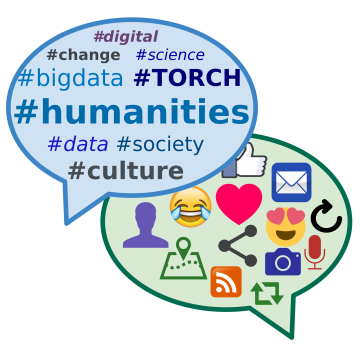#Social Humanities

This network was funded from March 2016 to Mar ch2018.
Social media never sleeps. Every minute of every day, 347,222 tweets are sent, 4,166,667 Facebook posts are liked, 300 hours of new YouTube videos are uploaded, 284,722 Snapchat images are shared, and 1,041,666 videos are played on Vine. These numbers have increased dramatically every year, and will only keep increasing. There is heightened demand for academics of all disciplines to develop methodologies and theories to make sense of this data explosion.
Nested in the ever-evolving and ever-expanding field of the digital humanities, the #SocialHumanities network explored the implications of social media for society, from platform design and usage to the volumes of data generated. How can we interpret such vast volumes of data, both quantitatively and qualitatively, while maintaining a humanistic perspective? How have social media platforms altered our language and behaviours? What are the methodological challenges and ethical issues that arise in the analysis of social media data? How do images (and other cultural objects) spread on social media, and how are they (re)appropriated? How can social media analytics help cultural institutions better understand their engagement with audiences? What is the value of social media for society? What are the dangers?
There are many unanswered questions. The establishment of #SocialHumanities allowed humanities scholars to more actively join in the conversations that social and computational scientists had initiated around these concerns. There was strong need for a more qualitative interpretation of social media data (especially data that is non-textual, such as images and videos), and for the integration of qualitative and quantitative approaches. This network allowed humanities scholars to engage with not only a vast range of other disciplines in Oxford, from Cybersecurity to Physics, but also with many non-academic partners, both internal and external to the University. Its aims were to foster highly interdisciplinary knowledge exchange and skills sharing, promote and improve mixed methods research, stimulate interaction between academics and non-academics (in particular, companies that worked with social media data), develop methodologies for the analysis of social media data, and enhance theoretical frameworks used for such analysis.
Past social media content can be found on #SocialHumanities on social media:
Contact:
Yin Yin Lu
Kathryn Eccles, Oxford Internet Institute
Ros Holmes
#Social Humanities

Lunchtime talk
- An Introduction to Digital Humanities "Expert insights into our digital landscape"
- An Introduction to the Guidelines of the Text Encoding Initiative "Markup for Textual Research"
- Analysing Humanities Data "An Introduction to Knowledge-Based Computing with the Wolfram Language"
- Digital Musicology "Applied computational and informatics methods for enhancing musicology"
- From Text to Tech "Corpus and Computational Linguistics for powerful text processing in the Humanities"
- Humanities Data: A Hands-On Approach "Making the Most of Messy Data"
- Linked Data for Digital Humanities "Publishing, Querying, and Linking on the Semantic Web"
- Social Humanities: Citizens at Scale in the Digital World "Social Media, Citizen Science, and Social Machines"
Closing Keynote: Open Access and Digital Humanities – Opening up to the World, Isabel Galina, (Universidad Nacional Autónoma de México)
- Introduction on Everyday Sexism with Laura bates
- Introduction to the Data with Taha Yasseri
- Speed Networking and Brainstorming with Kathryn Eccles
- Work with Data
- conversation between Laura Bates and Judy Wajcman
- Work With Data
- Introduction and overview of the day
- Workshops led by Mike Thelwall (SentiStrength), Taha Yasseri (topic modelling and Wikipedia), Jason Nurse (identity manifestation), Peter Fairfax (Brandwatch)
- Team formation
- Data analysis
- Presentation of findings and group discussion


